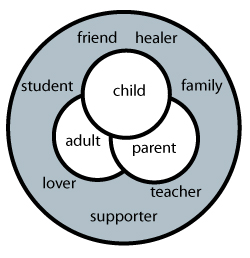
Roles and States
We have many roles to play in life, in which we act out a specific set of behaviours, emotions, and conversations (ABC's).
These roles tend to fall within specific archetypes sometimes referred to as ego-states. Importantly, these ego states are usually entered in the presence of someone else, known or unknown, in response to their role in our lives.

Roles we play include:
healthy children: loving, playful, curious, imaginative, happy, resilient
unhealthy children: unloved, withdrawn, angry, afraid, rebellious, passive.
- compliant children follow a parent to earn love; they typically experience guilt, shame, anxiety, and depression
- rebellious children protect themselves from the agenda of negative parents via walls, withdrawal, anger, or violence.
adults: mature, wise, in control of emotions, resilient, willing to meet things head on
healthy parents (nuturing, supportive, loving)
unhealthy parents (critical, controlling, absent)
- controlling parents are critical.
- negative nurturing parents can be over-indulgent
The bully - voices in our heads who berate us - is this our unhealthy adult?
- we can have dialogue with it; some suggest we need to love it and show it compassion. forgiveness yes, but compassion?
- it depends on what it is....
States expand on these roles and describe our particular consciousness. This includes:
- patterned emotions, behaviours, thoughts, and memories (ABC's)
- stored strategies, conscious and unconscious, to successfully receive from the interaction
- ongoing stimuli and response evolves during interaction
Roles depend on experience and development.
our parent state draws on experience from our parents, other authority figures, and cultural norms.
our adult state is created from present-time situations and responses, with a minimum of historical influences (ie baggage).
our child state represents childhood perceptions, feelings, and responses to simular stimuli.
A healthy person will have well-functioning and balanced components of children, adult, and parent.
The roles within us communicate with each other, and often people are aware of opposing forces inside.
Specifically, our parent will speak to our child, who will in turn respond. The health of our parent and child states is thus needed in order to have personal peace.
Another way of thinking about combinations is offered by the Structural Model of Transactional Analysis, which states the adult becomes contaminated with unhealthy parents and children. This imbalance can be so severe as to exclude altogether a parent or child from the person.
